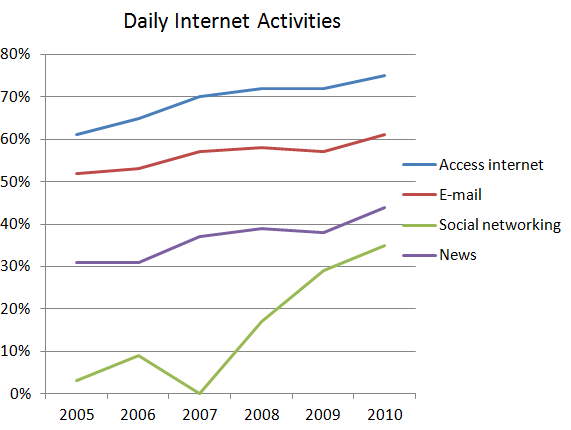Ragan recently commented on Vocus’ acquisition of iContact in an article entitled, Is email still necessary?
As a former Vocus product manager (and ardent supporter of the company), my first impression was “Wow, that was a big acquisition.”
My second thought was that it makes a lot of sense and here is why:
1. E-mail is a fundamental element – From a strict technology perspective, e-mail defines a system of peer-to-peer or peer-to-many message exchange. You could argue that the messaging system on any social networking site is essentially an e-mail system although I acknowledge that e-mail connotes various characteristics for how a system is accessed and what purpose it serves. Still, I believe that arguing that e-mail is dead is a little like arguing that messaging systems are dead and that seems like lunacy.
2. E-mail and social networks are intertwined – The growth of social media has been and continues to be facilitated by e-mail. Messaging systems on social networking sites gain traction only when they achieve distribution by patching into the e-mail systems associated with users. Social networks within sites are primarily driven by the contacts that the social application can find in a user’s e-mail address book. New user acquisition through current users can only be facilitated through e-mail. There are probably about twenty other core use cases that illustrate how important e-mail is to the everyday functioning of social networks. Saying that social media is rendering e-mail antiquated, is akin to saying that social networking is making the Web antiquated.
3. E-mail is ingrained into our lives – As much as the social mediaphiles love to talk about the growing irrelevance of e-mail in our everyday lives, there is no actual evidence to support their perspective (not that social mediaphiles ever use actual evidence to support any perspectives). Actual data (from Pew) shows pretty clearly that social networking’s meteoric rise really hasn’t come at the expense of e-mail.
4. Social networks come and go but your e-mail address remains the same – This may be borderline blasphemous but I’m going to say that sites like Facebook and Twitter can have a limited lifespan yet e-mail is permanent. I still have an @yahoo.com e-mail that contains e-mails I sent to people going back to 2006. In fact, my @yahoo.com e-mail serves as more of an actual historical account of my life than Facebook timeline ever will (although I do use @gmail.com these days (and @hotmail serves as a historical account of all the sites that forced me to use an e-mail that I was unsure about)).
5. E-mail comes with a sense of control that social networks can not emulate – A few months back, I wrote about how Facebook’s reckless approach to privacy was going to adversely effect the trust that users’ had in the service. I really think that trust and control are related here. Even though you feel control most of the time on a site like Facebook, major releases jolt you into the realization that at the end of the day, you are still living in Mark Zuckerberg’s fantasy.
6. E-mail is already battle hardened – E-mail is like a baby that grew up in a worn torn, disease infested city (where spammers, phishers and bad marketers are the virus). By the time it’s an adult, it has developed an immunity to every disease imaginable. It may not be the happiest, most go-lucky person in the world, but he or she is here to stay. The various filters, blocked e-mail domains, unsubscribes and more in my inbox are like callouses that have culminated in a tough, almost impervious skin. It’s taken countless hours to develop these callouses but the result is a pristine environment that I would never attempt to reconstruct on Facebook, LinkedIn or any other social networking site out there.


0 Comments on "The rumors of E-mail’s death have been greatly exaggerated"